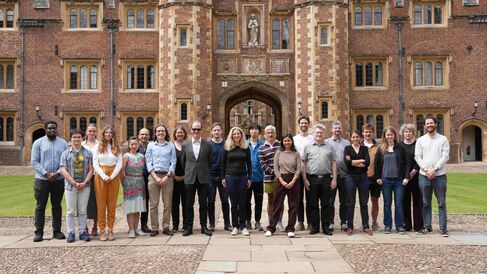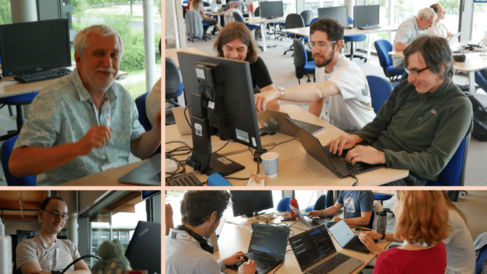
This July, the Institute of Computing for Climate Science hosted its second annual summer school in the vibrant city of Cambridge, a place that has been a focal point of learning and discovery for over 800 years.
Members of the VESRI and VISS communities were invited to attend a variety of technical training sessions, workshops as well as present their own research to others. Talks ranged from reducing uncertainty in climate models to using machine learning to emulate sea ice processes. ICCS research software engineers taught participants how to use GitHub effectively for collaborative development, followed by an introduction to GPU programming, how to use Pytorch for machine learning as well as demonstrating how the Hugging Face platform is useful for working with large, non-textual datasets. Alongside these sessions, participants enjoyed various networking opportunities during formal dinners, a wine and cheese tasting and a punting tour of the University colleges.
The summer school brought together climate scientists and software engineers in order to strengthen current ties and forge new collaborations, all in the pursuit of advancing climate modelling. Particular attention was paid to cultivate best practices in software engineering such as having open code. This helps to ensure that research is accessible and encourages researchers to build on previous work rather than having to start from scratch. Collaboration is especially key for the production of high fidelity climate models that are reproducible, and dynamically reflective of the real world.
Participants particularly enjoyed the Hackathon event. Teams of three to five people worked together on a coding project of their choosing. Senior research software engineer, Dr Tom Meltzer shares his take on the experience:
"The hackathon was a fantastic opportunity to learn more about the ICCS projects and experiment with those "wouldn't it be cool if we added X" features that don't necessarily get the development time they deserve. In just a short time, we managed to accelerate a small subsection of the code using ‘numba cuda’. This proof-of-concept implementation has now formed the foundations of a larger project to accelerate the rest of the code base. It was a great learning experience and it's amazing to see how much can be done in under a day's work."

Other participants gave their opinions as well:
- This was my favourite summer school I've been to.
- It was so well organised, everyone was so friendly.
- Conversations were so directly relevant and helpful to each other.
- I thought all the events and logistics went very smoothly and was impressed by the level of preparation by ICCS.
- The practical elements of each workshop were extremely useful.
- It was a great summer school!
Dr Daniel Lee, Senior Program Scientist at Schmidt Futures, our funding partner, looks forward to “our continued partnership to reimagine how science is done, to develop new lines of code and software, and to grow a scientific culture of change that is much bigger than one person alone.”
The 2023 summer school was a great success and ICCS anticipates hosting many future events to come.
